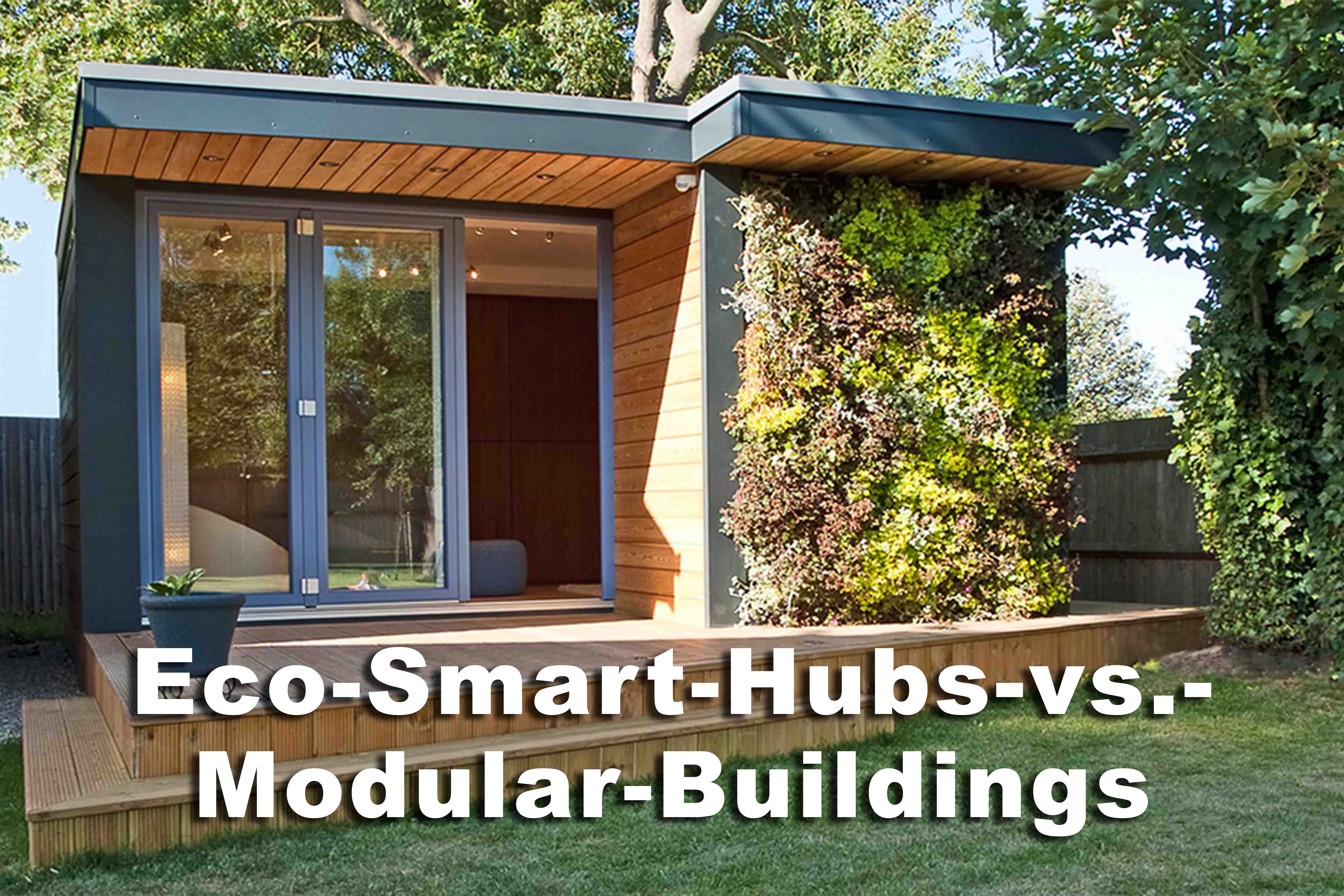

As the demand for additional home spaces continues to rise, more people are turning to innovative solutions like Garden Office Spaces and Modular Buildings. Both options provide flexible, functional spaces outside the main home, but how do they stack up against each other? In this blog, we’ll compare Eco Smart Hubs, solar-powered garden rooms, with Modular Buildings, to help you decide which option is best for your needs.
1. Sustainability and Energy Efficiency
- Eco Smart Hubs: One of the most significant advantages of Eco Smart Hubs is their sustainability. These garden offices are completely off-grid, powered entirely by solar energy, making them an eco-friendly solution. The use of Structurally Insulated Panels (SIPs) ensures excellent insulation, reducing the need for heating in the winter and cooling in the summer. This results in lower energy bills and a much-reduced carbon footprint.
- Modular Buildings: Modular buildings are pre-fabricated in factories, which can reduce construction waste and time on-site, but they typically require grid connection for power. While some modular buildings may be energy efficient, they often rely on traditional power sources unless additional solar or renewable energy systems are installed separately.
Winner: Eco Smart Hubs, for their built-in renewable energy system and superior insulation, making them the more sustainable option.
2. Off-Grid Capabilities
- Eco Smart Hubs: Designed for complete independence, Eco Smart Hubs can function entirely off-grid. With no need for an ESB connection, these hubs can be dropped into place and immediately ready for use. This is particularly advantageous for properties in remote areas or homeowners looking to reduce their reliance on the power grid.
- Modular Buildings: While modular buildings offer flexibility in design, they generally require connection to utilities, including electricity and water. Going off-grid with a modular building would require additional installations such as solar panels, batteries, or other off-grid systems, leading to extra costs and complexity.
Winner: Eco Smart Hubs, for their built-in off-grid capabilities, offering true independence from external power sources.
3. Installation Time
- Eco Smart Hubs: Installation is a breeze. The hubs are pre-fabricated, and thanks to their design, they can be installed and fully operational within just one day. No planning permission is required, making the process quick and hassle-free for homeowners who need a functional space fast.
- Modular Buildings: Modular buildings are also relatively fast to assemble compared to traditional construction methods, but they may require several days or even weeks, depending on the size and complexity of the unit. In some cases, planning permission may also be needed, extending the overall timeframe.
Winner: Eco Smart Hubs, for their one-day installation process and no need for planning permission.
4. Customization
- Eco Smart Hubs: These hubs offer bespoke designs that can be tailored to meet the specific needs of each homeowner. Whether you need a garden office, studio, or leisure space, Eco Smart Hubs are customizable, ensuring they fit both your functional needs and the aesthetic of your garden. You can also choose from ready-made models for quicker installation.
- Modular Buildings: Modular buildings offer a high degree of customization, with the ability to add rooms, adjust layouts, and select materials. However, custom modular units may take longer to manufacture and come with higher costs, especially for complex designs.
Winner: Tie. Both options provide a high degree of customization, but Eco Smart Hubs offer quicker, more straightforward customization for personal needs.
5. Cost and Grants
- Eco Smart Hubs: Eco Smart Hubs come with the added benefit of financial support. Homeowners can take advantage of the SEAI grant of up to €2400 for solar installation, making this eco-friendly option more affordable. Additionally, through Ireland’s Rent-a-Room Relief scheme, homeowners can earn up to €14,000 tax-free annually by renting out their hub as a living or work space.
- Modular Buildings: Modular buildings can vary widely in cost, depending on the size and level of customization. While they may offer long-term savings in construction time, they generally don’t come with specific financial incentives like the SEAI grant, especially if they are not energy-efficient or solar-powered by default.
Winner: Eco Smart Hubs, for the combination of SEAI grant support and the Rent-a-Room tax relief, making them a financially attractive option.
6. Planning Permission
- Eco Smart Hubs: One of the standout benefits of Eco Smart Hubs is that they do not require planning permission, providing an easy solution for those who want to avoid lengthy bureaucratic processes.
- Modular Buildings: Depending on the size and use of the modular building, planning permission may be required. Larger or permanent modular homes often fall under planning regulations, which can delay installation and add additional costs.
Winner: Eco Smart Hubs, for their no-planning-permission-required advantage.
Conclusion: Which One is Right for You?
If you’re looking for a quick-to-install, fully off-grid, and energy-efficient space with customizable designs and financial benefits, Eco Smart Hubs are an excellent choice. They offer sustainability, low energy costs, and no planning headaches, making them ideal for those seeking an eco-friendly solution for garden offices or other uses.
On the other hand, Modular Buildings offer more flexibility in terms of size and layout but may require more installation time, utility connections, and possibly planning permission.
For those prioritizing sustainability, ease of installation, and long-term cost savings, Eco Smart Hubs come out on top in this comparison.
